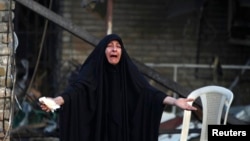Islamic State militants continue to unleash a daily wave of multiple car bombings in the Iraqi capital, Baghdad, and across other parts of the country in an apparent bid to destabilize Iraq's faltering military forces.
Following another round of bloody attacks Tuesday, which included at least 25 deaths in the Baghdad district of Khadimiya, Iraqi officials are scrambling to reassure residents that the capital remains secure.
Meanwhile, Islamic State militants have seized more territory in Iraq's Anbar province.
Iraqi security forces warned Wednesday the insurgents were close to taking Amriyat al-Fallujah, a town 35 kilometers west of the capital Baghdad.
The local police chief said the jihadists had approached the town from three directions, leaving it "almost besieged."
Speaking to cadets
Prime Minister Haidar al-Abadi told a graduating class of military cadets in the town of Nassiriyah on Wednesday that security in Baghdad remains tight.
Abadi said the capital is being protected by its armed forces and that it is secure.
He advised residents to ignore claims made by Islamic State militants.
Abadi told the cadets the security perimeter of the capital had been expanded, and that Islamic State militants had been pushed back from around the city.
Iraq's civil aviation chief also held a news conference to reassure Iraqis and others that travel to Baghdad International Airport remained safe and was operating normally.
Despite reassurances from central government officials, the head of the Kurdish Peshmerga militia, Jabar Yawar, told journalists Wednesday that there are worries about the security of both the capital and the airport.
Security concerns in Baghdad
Yawar said there is concern over security in a number of Baghdad areas and military reports predicting an increase in the number of bomb attacks to further destabilize security in the capital.
He added that there are also concerns that rockets fired from the southwest of Baghdad could reach the airport.
Iraq's Asharqiya TV said that intelligence officials believe up to a dozen shoulder-fired, Stinger-type, surface-to-air missiles may have been captured by Islamic State militants after they captured the city of Mosul in June.
Also Wednesday, Australia said it had offered to send 200 special forces troops to Iraq, but wanted the Iraqi government to provide legal protections for them first.
Prime Minister Tony Abbott said he expects an agreement to be reached soon clearing the way for their deployment.




